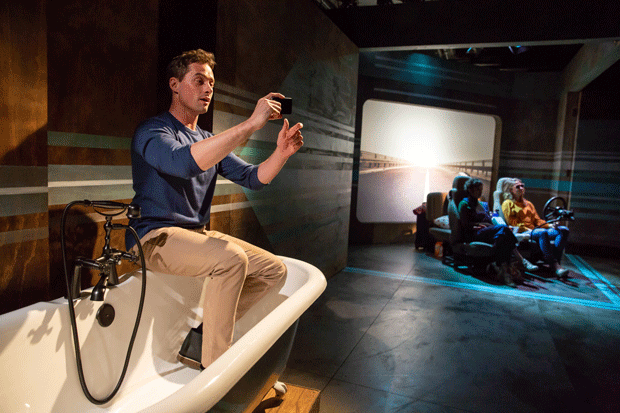Adulting Is Hard for Three Millennials in Georgia Mertching Is Dead

(© Jeremy Daniel)
Pack some friends into a car, send them off on a long drive, and watch them learn life lessons along the way. Catya McMullen recycles that familiar American narrative in her new comedy-drama Georgia Mertching Is Dead, now running in its world-premiere production at Ensemble Studio Theatre.
Instead of beatniks or old men with a bucket list, though, McMullen gives us a trio of 30-ish millennials, each of whom is trapped in her own stage of arrested development. Gretchen (Diana Oh) is a very pregnant mom who's terrified of leaving her friends and moving to the suburbs. Emma (Claire Siebers) is a successful writer who's irresistibly drawn to toxic exes. And Whitney (Layla Khoshnoudi) is a queer woman who's stuck in neutral as her youth speeds away without her. "Should we be married with babies?" she asks Emma. "Thirty is the new 12," says Emma. It's a hilarious millennial quip — and in their case, maybe just a little too true.
All three once abused drugs, and their continuing recovery has bound them in a tight sisterhood. Gretchen has managed to pull herself into middle-class respectability and is now being pressured by her foot-stomping husband, Jeremy (J.D. Taylor), to move out of noisy New York to more family-friendly Connecticut. His plans for them to see a house there are derailed by news of the suicide of Georgia Mertching, a onetime close friend of Gretchen, Emma, and Whitney. Even though Gretchen is about zero days away from giving birth, she squeezes herself into a car with her two besties, and they set out on a road trip from the city to North Carolina for the funeral.

(© Jeremy Daniel)
These three friends have encountered one overdose-induced death after another, so mortality is an issue they've already wrestled with. The issue they haven't addressed is the reality that one day they might have to be apart from one another. Their ongoing sobriety has tethered them in a bond that strengthens them but also prevents them from moving forward. They're like high school seniors who pledge they'll definitely go to the same college and stay inseparable friends forever — and then actually do.
One problem with this play is that it seems stuck in its own state of protracted adolescence. In the opening scene, Gretchen describes, in explicit detail, the very real discomfort of a woman in her stage of pregnancy. Oh's exhaustingly over-the-top performance makes it clear that the vulgarity and blue jokes are there to make us laugh. Unfortunately, the humor in this scene and during that long car ride comes off not just as adolescent but juvenile. "Who's the oldest person you'd have sex with?" asks Gretchen as the three try to pass the time. If you don't find questions like that provocative, you might get the urge to tuck and roll.

(© Jeremy Daniel)
A reprieve of sorts comes when they exit the car and Emma's bearded ex, Harlan (Quincy Dunn-Baker), enters and starts oozing tortured-artist charm. We know he's no good for her from the moment codependent Emma ditches her friends — and the funeral — to hook up with this smooth-talking phony, and we also know that she won't resist his advances. There's deep hurt inside Emma, and Siebers lets us see it, matching Dunn-Baker punch for punch in a violent scene of sexual desperation, and for a time, the veil of tediousness that settled on us during that long car ride lifts.
Not for long, though. The walls of Alexis Distler's wood-paneled set swing open again to reveal the car interior with a superfluous image of a highway behind it, and we're right back on the road. Almeda Beynon adds equally unnecessary sound effects to the scene, such as car doors slamming, that director Giovanna Sardelli might better have dispensed with. During 100 frenetic minutes of travel and self-discovery, the play's destination can be seen miles away. It's not an entirely unpleasant journey, but we're relieved to finally get up and stretch our legs.











